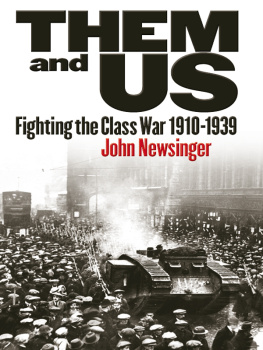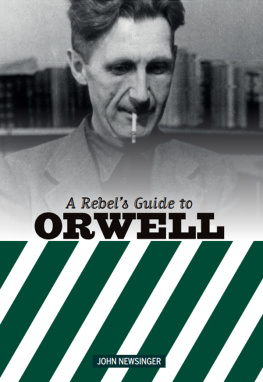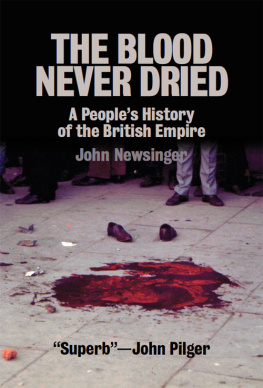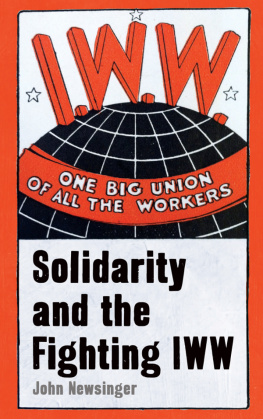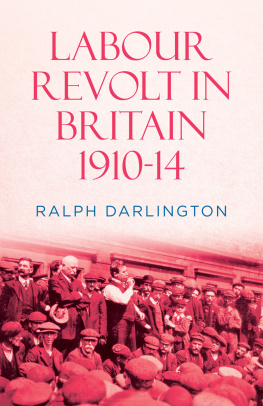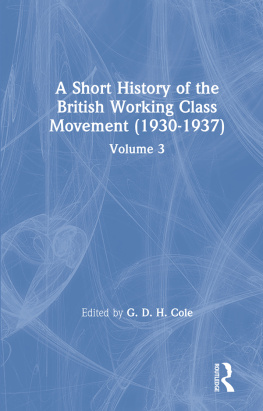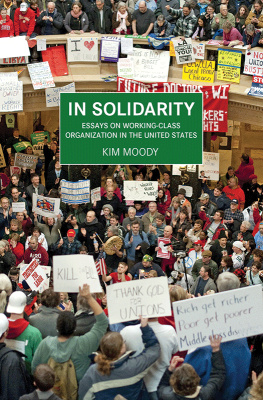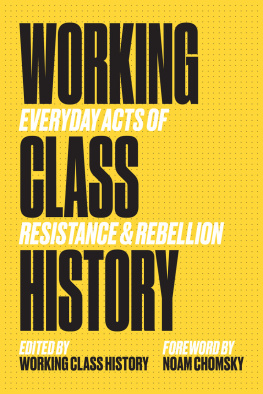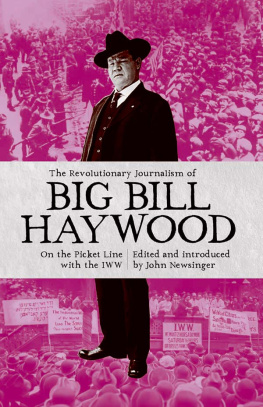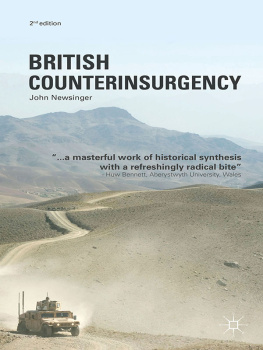THEM AND US
Fighting the Class War
1910-1939
John Newsinger
About the author
John Newsinger is Professor of History at Bath Spa University and a long-standing member of the Socialist Workers Party. He has been a senior shop steward in the Amalgamated Union of Engineering Workers (AUEW), a school rep in the National Union of Teachers (NUT) and branch chair in the University and College Union (UCU). He is the author of numerous books including Orwells Politics (Macmillan, 2000), Fighting Back: The American Working Class in the 1930s (Bookmarks, 2012), The Blood Never Dried: A Peoples History of the British Empire (Bookmarks, 2013) and Jim Larkin & the Great Dublin Lockout of 1913 (Bookmarks, 2014). A new paperback edition of his British Counterinsurgency: From Palestine to Afghanistan is being published.
Acknowledgements
Thanks to Siobhan Brown, John Charlton and Michael Bradley for their comments and insights. And thank you to Sally Campbell, Peter Robinson, Carol Williams and Lina Nicolli for their work on the production.
THEM AND US
Fighting the Class War
1910-1939
John Newsinger

Them and Us:
Fighting the Class War 1910-1939
John Newsinger
Published 2015 by Bookmarks Publications
c/o 1 Bloomsbury Street, London WC1B 3QE
Bookmarks Publications
Designed and typeset by Peter Robinson
Cover picture: A tank on Glasgows Trongate, 1919
Printed by Melita Press
ISBN print edition: 978 1 909026 58 2
ISBN Kindle: 978 1 909026 59 9
ISBN e-Pub: 978 1 909026 60 5
ISBN PDF: 978 1 909026 61 2
CONTENTS
Introduction
We live in a period of unprecedented class warfare. There has not been such an unrelenting and sustained attack on the working class in our lifetimes as that carried out by the Cameron Coalition government under the banner of Austerity.
This proposition will come as a surprise to many people but only because the war has so far been so one-sided. Their side has been dishing it out with relish, enjoying every moment of the hardship, suffering and misery they have inflicted, while positively glorying in their increasing wealth and privilege. The dismantling of the welfare state has proceeded at an unprecedented pace, with the promise of more to come. The Coalition did its best to push forward the process of privatisation in the NHS and to prepare the way for the privatisation of state education. And, of course, there are many leading Labour politicians who privately share the Coalitions ambitions. Now that the Tories have been returned to office we can expect the attack to intensify dramatically.
Today, in one of the richest countries in the world, families are going hungry and find themselves relying on food banks. Not too long ago such a situation would have been regarded as unthinkable, as a national scandal, and the suggestion that any government would actually set about making the situation worse as the wildest scaremongering. Instead, we have seen Iain Duncan Smith, the Coalitions Secretary of State for Work and Pensions, although Minister for Hunger would be more appropriate, presiding over a benefits regime that deliberately and calculatedly left people destitute and hungry.
Whereas Margaret Thatcher, back in the 1980s, had told an incredulous minister that a regime of soup kitchens would be necessary to discipline the working class, Smith, surely one of the most contemptible politicians of recent memory, cheerfully presided over a situation where hundreds of thousands of working class people were dependent on food banks! This was class war waged with a vengeance. Hardest hit have been the young, with their wages driven down and working conditions dramatically eroded. They are being conditioned for a world of permanent insecurity.
So far our side has been taking it and the fight back has been small scale, localised and, as far as the leaders of the labour movement are concerned, at best half-hearted and at worst betrayed. Opportunities to defeat the Coalition were thrown away by union leaders who often seemed to consider the Grand Old Duke of York as the last word in leadership: marching the troops up the hill with the sole purpose being to march them down again. And as for the Labour Party, its opposition to the Coalition was absolutely pathetic, compromised by the fact that so many Coalition policies were continuations of what New Labour started.
Many senior Labour figures privately sympathise with the Coalition attacks. They regard them as necessary to safeguard British capitalism and would have done much the same had they won the 2010 general election. It is worth remembering that Atos, the much-hated company put in charge of medical assessments and charged with cutting benefits, was not given the job by the Coalition but by the previous Labour government. As readers of this book will discover, a gutless Labour Party primarily concerned to avoid upsetting the rich and hostile to trade union militancy is nothing new.
There have been some small victories and hard-won successes for our sidebattles won by courage, determination, organisation, and sacrifice. But so far nothing has been big or dramatic enough to change a balance of class forces heavily weighted in favour of the ruling class or to inspire others to action and to begin recreating a culture of solidarity.
Austerity has, of course, been very one-sided. According to the Social Market Foundation, between 2005 and 2012-13 the wealth of the best-off fifth of the population rose by 64 percent while that of the bottom fifth fell by 57 percent. These increasing levels of inequality began under Labour but then worsened under the Coalition. Never has the principle of one rule for the rich and another for everyone else been so openly flaunted. While six million public sector workers in hospitals, schools and the civil service have had their pay frozen by the Coalition, one of the architects of austerity, George Osbornes chief of staff, Rupert Harrison, was given a 19 percent pay rise by his government chums last year. His pay rise was 2,000 more than the minimum wage! And chums is the right word because Rupert was, of course, a former head boy at Eton!
While austerity has been the lot of the great majority, the Coalition government ensured that the rich and super rich have prospered as never before. Under Blair and Brown, London became a magnet for the international rich and super-rich, but once again the situation has got worse under the Coalition. Today, working class families are being driven out of London, socially cleansed, at the very same time that the capital is becoming a paradise for the international super-rich who are flocking here in unprecedented numbers. They feel safe and secure in a country where the working class appears to have been forever broken as a force for change. The British upper class way of life is something that the super-rich throughout the world admire and more and more of them are coming here in order to be able to live it. This is the great legacy of Thatcher, Blair, Brown and Cameron: a country fit for rich parasites.
Across the country there are millions of people longing for a fight-back against this ruling class offensive. Why hasnt it kicked off yet in Britain? Today employers are able to push through pay cuts and worsening conditions that would once have shut down whole industries. Why?
There is a widespread lack of confidence among working people. Even though people bitterly resent what is being done to them, they often cant see any way to fight back. Traditions of solidarity and collective action built up through years of struggle have been eroded since the defeats of the 1980s. Nothing better illustrates this than the spectacle of the then Labour Shadow Minister for Education no less, Tristram Hunt, crossing a lecturers picket line to give a lecture on Marxism! Rather than any sense of shame, he couldnt understand what the fuss was about. Casualisation, zero hours contracts and self-employment (often casualisation under another name) have all contributed, breaking down solidarity and setting people against each other. The ideal world for the employers is one where workers are forever competing against each other, where there is no collective consciousness, no solidarity. Indeed, they want the very idea that struggle can improve things to be eradicated. And to a considerable extent they have been successful in achieving this objective.

